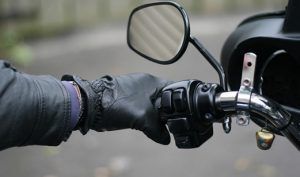It is the nice summer days that motorcyclists dream about. The wind blowing through their hair and the miles and miles of pavement lying beneath their bike is all that most ask for. Yet, there are the inevitable dangers when entering the highway on a two  wheeled machine that you may encounter. (Did You Know?) People who crash while riding a motorcycle are 30% more likely to die in the crash compared to those who are in a car collision. With these simple tips and tricks on how to stay safe while enjoying the ride, you are sure to be prepared for anything.
wheeled machine that you may encounter. (Did You Know?) People who crash while riding a motorcycle are 30% more likely to die in the crash compared to those who are in a car collision. With these simple tips and tricks on how to stay safe while enjoying the ride, you are sure to be prepared for anything.
If purchasing a bike for the first time, buy a bike that fits you. You should not have to be on your tiptoes when in a resting position and the handles should be at an easy reaching point. Today’s bikes are not like they were 20 – 30 years ago. Make sure you can handle the weight and speed of the motorcycle before making a final decision.
For those of you who know your motorcycle inside and out, there is always more that you can learn. One of the best ways to better prepare yourself before heading out on a motorcycle is to take a riding course. These courses teach everything from basic to advanced techniques when it comes to motorcycles. You can find training courses near you at this link.
Although there are multiple ways to prevent an accident when on a motorcycle, you can always protect yourself with the proper equipment (including self and bike) that will make it less likely for you to have a serious injury.
- Wearing the proper gear: T-shirts and jeans do not cut it when it comes to what to wear when riding a motorcycle. Padded clothing, like a heavy leather jacket and pants, are ideal when riding a motorcycle. Gloves and boots that cover the ankle are suggested, as well. Gear is available in breathable materials as well as bright colors, making it comfortable for the rider and easier for other motorists to see the motorcyclist. And do not forget to wear a helmet, and if possible, a full face helmet.
Helmet laws are not enforced everywhere in the United States. Only 19 states and D.C. have universal helmet laws that require all riders to use a helmet. 28 other states have partial helmet laws that apply to some motorcyclists — usually those under age 18 or 21. Only 3 states (Illinois, Iowa, and New Hampshire) have no helmet requirements of any kind. West Virginia, however, is one of the few states that does require the use of a helmet for all riders while on the highway.
As a final note for motorcyclist, always be prepared. Check your bike before going out, put on the proper equipment and be a defensive driver. Be sure other drivers are aware of your presence and keep a safe distance in all directions. The more prepared a motorcyclist can be, the less likely an accident is to occur.
If you or someone you know has been involved in a motorcycle accident, contact an accident lawyer to take your case.







